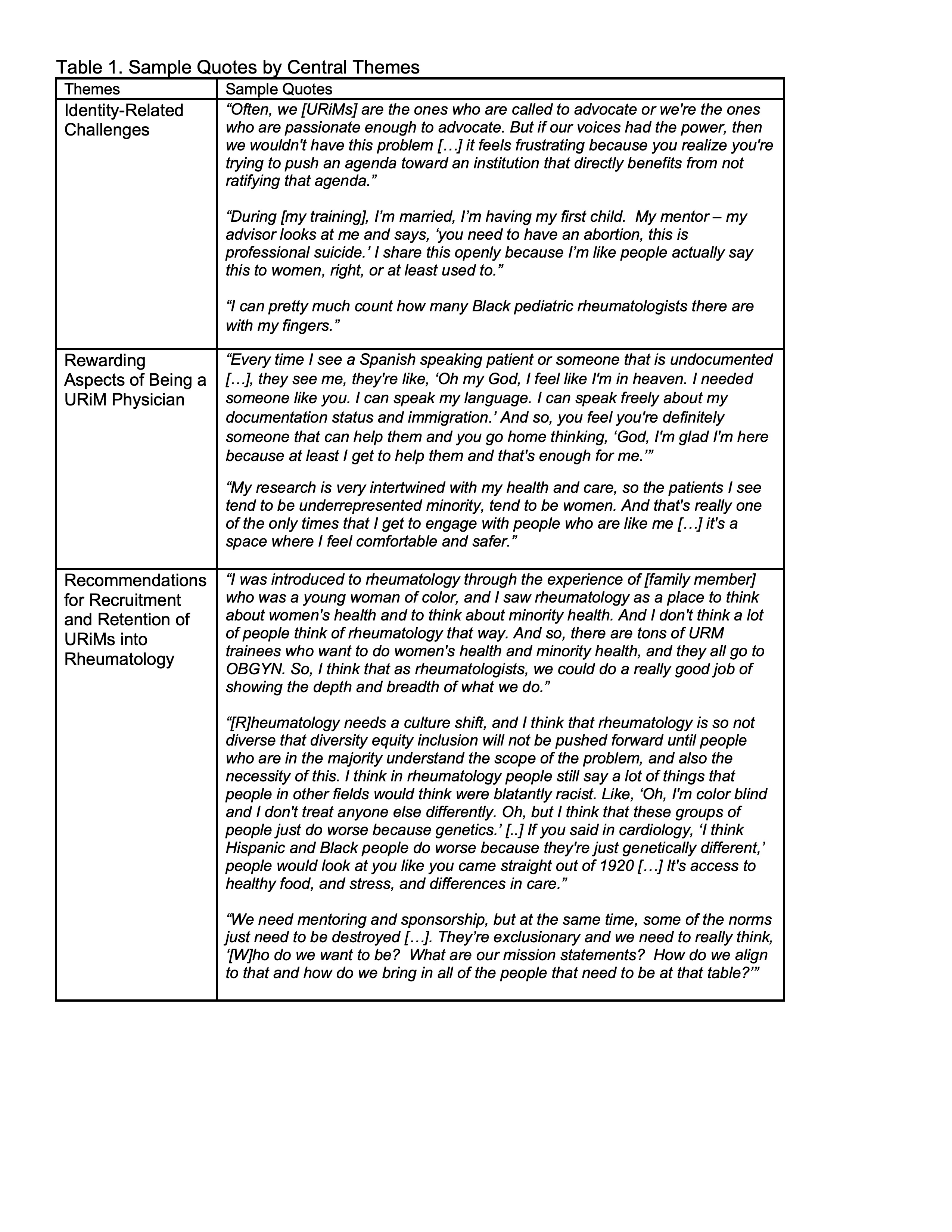Session Information
Session Type: Poster Session A
Session Time: 10:30AM-12:30PM
Background/Purpose: Providing racially and ethnically concordant care in minoritized populations by providers identifying as underrepresented in medicine (URiM) has been reported to be associated with improved outcomes for these communities, increased patient engagement, increased satisfaction during clinic visits, and even longer life expectancy and lower all-cause mortality rates. Despite this, there continues to be a deficit of URiM trainees and providers, with this shortage likely worsening with an increasingly aging population and workforce shortages. The purpose of this qualitative study was to understand the experiences of URiM physicians in adult and pediatric rheumatology, with the goal of outlining a path toward a more inclusive and representative workforce.
Methods: We conducted 16 semi-structured interviews with URiM-identifying rheumatologists. 12 participants were female-identifying and of the 16, 11 were adult rheumatologists. Interviews were audio-recorded, de-identified, transcribed verbatim, and analyzed for themes using grounded theory.
Results: Our analysis identified 3 major themes: Identity-Related Challenges; Rewarding Aspects of Being a URiM Physician; and Recommendations for Recruitment and Retention of URiMs into Rheumatology. Table 1.
Identity-Related Challenges
“Diversity in medicine is abysmal.”
Participants shared incidents of racially driven micro/macroaggressions by patients and staff alike, hostile sexism, and the unique, competing responsibilities that female physicians experience. Participants also described systemic barriers they faced when promoting diversity, equity, and inclusion.
Rewarding Aspects
“‘I needed someone like you.’”
Interviewees described a sense of fulfillment in working with patients from minoritized communities, often a motivating factor in pursuing a career in rheumatology. Participants described a feeling of mutual understanding with their patients, facilitated by a shared language, culture, or physical appearance.
Recommendations for Recruitment and Retention
“It’s also really important to be a mentor […] because there’s not a lot of you and me in medicine and in rheumatology.”
Recruitment recommendations focused on increasing trainee exposure to rheumatology early in their training and highlighting the breadth of their clinical expertise and potential role in addressing health disparities. They emphasized the role of mentorship, and while opinions varied with regard to race, ethnic, and gender concordance, it was agreed that awareness of URiM-specific needs is integral to a successful relationship.
Conclusion: URiM physicians in rheumatology continue to face discrimination in the workplace, struggle with competing responsibilities related to work-life balance, and work in systems designed to prevent their upward mobility. Nonetheless, resilience among URiM physicians appeared to be facilitated by an obligation to marginalized communities and meaningful connections with their patients. These results underscore the need for URiM-specific support, re-evaluation of traditional metrics of success, and continued efforts in addressing systemic racism in medicine.
To cite this abstract in AMA style:
Valdovinos R, Martin A, Mehta J, Blanco I. Rheumatology, Heal Thyself: The Experience of Underrepresented Physicians in Rheumatology [abstract]. Arthritis Rheumatol. 2024; 76 (suppl 9). https://acrabstracts.org/abstract/rheumatology-heal-thyself-the-experience-of-underrepresented-physicians-in-rheumatology/. Accessed .« Back to ACR Convergence 2024
ACR Meeting Abstracts - https://acrabstracts.org/abstract/rheumatology-heal-thyself-the-experience-of-underrepresented-physicians-in-rheumatology/

